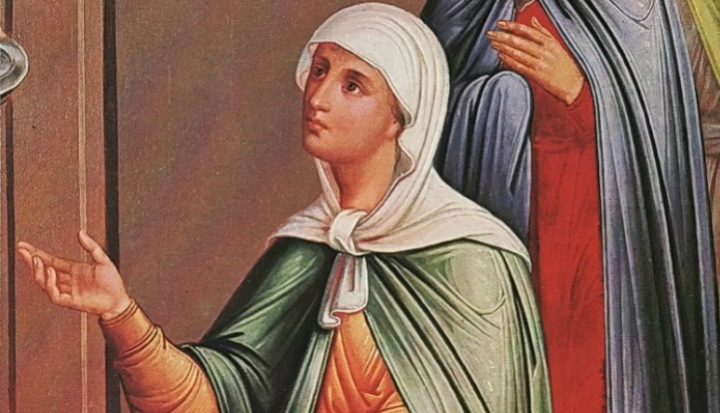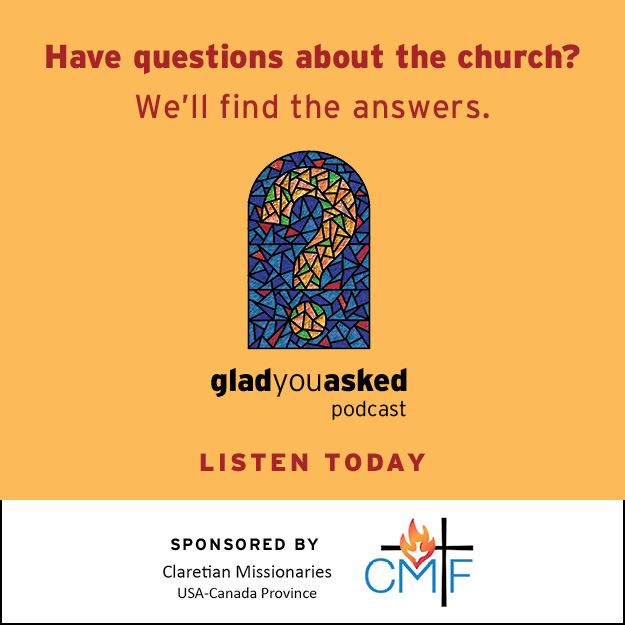Scripture scholar and Dominican Sister Barbara Reid took her first Bible course when she was a junior in college. It was an elective. “I was just so amazed at how it opened up a whole world for me,” she says. “I was also a little angry and thought, ‘Why didn’t anyone ever teach me anything about the Bible?’ ”
She’d attended Catholic schools her whole life but had never been encouraged to do more than listen to the stories of scripture. That course in her junior year changed everything. Later that year, she joined the Dominican Sisters of Grand Rapids and dove into all the scripture courses she could find. She also joined a charismatic prayer group and was unsettled by some of the ways scripture was being interpreted. She knew that wasn’t the way the Bible ought to be read. So she pursued a doctorate in scripture because she wanted to learn good biblical interpretation.
Reid is now the general editor of the Wisdom Commentary, a series of feminist commentaries on every book of the Bible, the first of its kind to offer feminist interpretations of the entire Bible. Contributors hail from around the globe and bring experience and expertise from a variety of traditions and cultures, something Reid says is crucial to reading and interpreting the Bible. She’s quick to point out, however, that there are many forerunners to the Wisdom Commentary: “This is not a modern day phenomenon. Women have been interpreting the Bible through their own experience and their own lenses from time immemorial.”
What does it mean to do feminist biblical interpretation?
Feminism is a perspective and a movement that begins by recognizing that there are great inequities toward women in the church and in society. The movement advocates for changes in not only interpersonal relationships but also the structures that keep all people from flourishing. It’s not only about women. All of us benefit when the inequities against women are addressed.
Feminist biblical interpretation approaches the Bible with the consciousness that the Bible was, for the most part, written by men, for men, about men, and to serve men’s interests.
Now, as I say that, I am not trying to denigrate men. It’s very important to recognize the historical contexts from which our scriptures come and that, for the most part, the perspectives represented in the scriptures are not women’s.
Feminist biblical interpretation starts from that basic recognition and then approaches the Bible with a set of questions such as: Where were the women? What was their experience? How would they have received what was being said about them or addressed to them? What do we know historically about what women were doing? What do we know about the cultural mores of the day?
For example, if Paul says women should keep silent in churches, what did the women think about that? What was the precise situation he was addressing? Clearly women had to have been speaking out if Paul is saying, “You shouldn’t speak out.”
We don’t paint all women with the same brush because experiences varied depending on whether they lived in the city or in the countryside, whether they lived in Greece or Rome, Jerusalem or rural Galilee, or whether they were Jews or Gentiles.
We start by trying to get to the root of their experiences and ask how we can put ourselves in their shoes before we start to relate the scripture to today. And we do the same hard work of analyzing social realities and contexts in our day, too, because the same text won’t mean the same thing to different people in today’s world.
On one of my sabbaticals, I had the opportunity to spend time in different parts of Latin America. I very much wanted to learn how women who are poor and in rural Mexico, for example, hear biblical texts. Do they sound very different to a privileged, white, North American woman like myself?
That’s part of what goes into feminist biblical interpretation; it tries to keep the perspective of women’s experience in the foreground.
Another part is to do critical analysis of the social, cultural, and historical structures that create the inequities. Then we ask how what we’re interpreting affects the real-life situations of women and men in the church today.
Is this a new way of reading the Bible?
Women have always told Bible stories to their children and relied on it to help navigate challenges. The problem is that until recent decades women’s work in biblical interpretation has been largely lost.
We know of a few forerunners from early days. One that I discovered while working on the Wisdom Commentary series was a woman named Helie who lived in the second century. Her parents wanted her to marry, and she refused. They brought her before a judge who tried to force her to get married. The judge quoted to her 1 Corinthians 7:9: “It’s better to marry than to be aflame with passion.” Helie first says she recognizes that’s what Paul says, but then she comes back with, “But not for everyone. Not for holy virgins.”
She’s really one of the first women we know of to question the notion that one meaning of the text fits all times, places, and circumstances. In a certain sense, she’s already a fore-runner to those who espouse the historical-critical method of biblical interpretation. These scholars say you have to take the historical context into account and not manipulate the text to mean what you want it to mean.
We also know of a Jewish woman who lived around the same time by the name of Beruriah. She came from a family of rabbis. She challenged her husband, Rabbi Meir. When he prayed for the destruction of a sinner, she argued that Psalm 104 says that you should pray for the destruction of sin, not the sinner.
Women have always questioned the prevailing biblical interpretation, that of their husbands or the men who are interpreting the Bible in their communities. They’ve always paid attention to their experience and brought their critical minds to it.
Why do you think feminist biblical interpretation gets marginalized in scripture studies?
For a long time the historical-critical method, where you look at and analyze the historical context of scripture, has been considered a standard approach to biblical interpretation. Any method that starts by acknowledging the particular lenses we bring to the text is often considered something other than standard biblical interpretation.
I don’t want to give the impression that I’m denigrating the work of our forerunners in biblical interpretation. They were tremendous scholars, but all of us have our limitations in what we bring to the text. Our own perspectives very much color how we interpret the Bible. Feminists are trying to urge all biblical interpreters to recognize their own bias.
Take the parable of the vineyard workers in Matthew 20, the one where the vineyard owner goes out five times during the day and all throughout the day keeps hiring more people to go out to the vineyard, and then at the end of the day pays everybody the same.
I always had a terrible time with that parable because it didn’t seem fair that others come in at the last minute and get the same wage. Having been baptized on day six of my life and having worked in the church my whole adult life, I saw myself as one of those called early on who’s out in the vineyard working and hoping that there’d be some equitable recompense at the end of the day.
As much as I struggled with that, I never saw it from the perspective that was shared with me by a woman when I was giving a workshop one time years ago in Denver. I’ve never forgotten what she saw in that parable. She explained to me that she was a single mother. Her husband had left her. She had three children. She had no education, no skills, and struggled to make ends meet.
She waited day after day in unemployment lines hoping somebody would hire her. She was willing to do anything just so that she could feed her babies. “The people who are standing on the corner all day, they’re not lazy people,” she said. “They’re like me. They’re willing to work. They’re probably the ones who have disabilities, who look old, who look feeble, who look sick, who the vineyard owner is going to pass up because it doesn’t look like he’s going to be able to get as much work out of them as the younger, heartier, healthier ones.
“They get passed up until the vineyard owner is desperate to get his harvest in, and he’ll take anybody,” she said. “The way that I see it, if that vineyard owner gives the workers who came last any less than the minimum to be able to feed their families at the end of the day, what good is that at all?
“If that vineyard owner is God, then what this parable tells us is that everybody deserves to eat at the end of the day, and it doesn’t depend on how long you worked. You don’t work for your food in the kingdom of God,” she said.
Then she pointed out that even though some workers had been toiling all day in the sun, they’d also had the assurance, all day long, that at the end of the day they were going to be able to feed their children.
From my privileged perch, I never would have seen the parable that way. In a similar way, many of my male colleagues simply would not see the absence or presence of women or how a text might affect women the way I might, having honed my lenses to be able to look for that in particular.
Do you have a favorite biblical passage that this method reinterprets?
In Luke 18:1–8, the parable of the widow and the judge, most people see the judge as the God figure. They stand on their head and turn cartwheels to try to figure out how an unjust judge can be a God figure.
But I see the widow as the God figure, our God who always takes the side of the one who’s been wronged, who is absolutely persistent, and who will not give up until justice is accomplished.
The widow is a kind of patron saint of feminists because she’s the unexpected face of God. She is so tenacious and persistent. She has to go back to court day after day. She gets ignored. She gets put to the back of the line.
Now, this isn’t in the text, but I imagine that the judge hears first the cases of those who have money to bribe him. But the widow will not go away, and her persistence is what finally brings about justice.
She’s also not foolish enough to think that she’s converted the unjust judge. At the end, he still says, “I have no respect for God or for any human being.” He says it’s only because he’s afraid that she’s going to give him a black eye that he’s going to give her justice. That line is not usually translated that way, but that’s what it says literally. It’s a funny image of a powerful judge cowering before a supposedly powerless little widow.
As the reader of the parable, we know she’s not going to hurt him. It’s a delightful twist that she’s now the one who’s got the power, and he’s relinquished it to her. She hasn’t changed the whole system, but she has gotten one small victory for justice.
This widow can encourage feminists as she’s an icon for what it means to do the work of justice. She’s incredibly persistent, but she also teaches that when you have nothing left to lose, you step out of bounds.
What can feminist biblical interpretation unearth about Jesus’ relationships to his disciples?
The Gospel of John uses the metaphor of friendship more than any other gospel. It’s the primary metaphor Jesus uses for his relationship with his disciples. He very explicitly says in his final discourse to the disciples in John 15 that “I call you friends, no longer servants, but friends.”
I wish that we would put that line from scripture above every church door and on all of our walls, because, for some reason, the metaphor of lord and servants has really stuck as our primary way of understanding our relationship with God. The great feminist scripture scholar Elisabeth Schüssler Fiorenza has been very helpful in pointing out that this kind of imagery keeps very firmly in place patriarchal systems that keep women subordinate to men.
We’ve translated this lord and servant metaphor into how women then see themselves as subservient to powerful men. This is a very difficult relationship to undo because it’s been used for so long. Moreover those of us who live in the United States don’t have lords and ladies and servants and slaves and masters. We also have a very dreadful history of slavery. However that metaphor is very complex. There can be a liberating aspect to it, for example, when African Americans use that metaphor to talk about being slaves of God, slaves of the Lord, slaves of Jesus.
It can be liberating and subversive for Blacks to assert that they are not slaves of a white master, to say: “We are slaves of our God and Lord only, and you can’t enslave my heart. You can’t enslave my spirit. You can’t enslave my soul.”
Pope Francis, in his New Year’s Day address last year, had some very strong comments about modern forms of slavery and the systems that keep it in place—for example, the trafficking of women and children and disadvantaged males. I wonder if taking his lead, we might start putting aside more of that master-slave metaphor for our relationship with God and Jesus. One way of approaching this is to begin using some other metaphors like the friendship metaphor that’s so strong in the Gospel of John.
How is interpreting the Bible an act of power?
Whoever interprets for the community shapes the minds and hearts and spiritual lives of people, whether it be a biblical scholar who writes her reflections or a preacher who preaches from the scriptures.
Women have been greatly affected by these power dynamics that keep them in subservient positions. Interpreting the Bible differently and encouraging people who have traditionally been in subservient positions to ask different questions is both empowering for them and threatening to those in power.
The same thing happens in Jesus’ life: He empowers the disenfranchised, and that’s a very strong challenge to those who have power, privilege, and status. The powerful will always do their very best to silence or even kill any prophet who challenges the status quo. We see that dynamic very clearly at work in the life of Jesus and all those who’ve followed in his footsteps.
Sometimes people dismiss or speak critically about feminist women and describe them as only wanting to grab power. They make it sound like power is something evil or something that will ruin women. I think it’s much more complex than that. Power is a good thing. We need to use power in its best and most transformative ways.
The gospel is a powerful tool and preaching the gospel is an act of power. The gospel empowers those who have been oppressed and challenges those who misuse it.
What many feminists advocate today is that women should not be kept out of arenas where power is exercised in the world and in the church simply on the basis of their sex. We’re all impoverished when women’s gifts are not able to be fully used. This affects all of us. It’s not a power grab for women. It’s women wanting to use their gifts for empowerment for the whole church.
Why is it so hard to dismantle the language and culture of patriarchy in our church and the world?
I don’t think any unjust system gets broken down easily. Take for example Paul’s insistence that there is no more Jew or Gentile, slave or free, male or female. The dividing wall between Jew and Gentile was one of the very most difficult for the early Christians to work through. Even though we would probably say that that got resolved in the first centuries of the church, a very long legacy of Christian anti-Judaism remains.
It took 18 centuries of Christianity and the U.S. Civil War to address the question of slave and free. The Bible was used to shore up a system of slavery in this country. And even though slavery is now illegal in this country, there are many new forms of enslavement throughout the world. The slave/free dichotomy is something we still have not overcome.
I think we’ve made great strides in overcoming gender barriers. It is always going to be hard work. Part of it is how we’re brought up. We were brought up to think that’s the way life is. It’s very hard to dismantle that and reimagine the world differently.
People resist dismantling gender inequality very strongly because it really does mean turning your whole world upside down and reframing the way that you think about everything in the world. It does entail a struggle, and people have to be prepared that it’s not going to be an easy turnaround.
It’s almost as big a shift as the shift we had to make when Copernicus and Galileo insisted that the earth is not the center of the solar system. What did it take—some 300 years for Galileo to be exonerated after having been excommunicated for advocating such notions? Our notions of how we envision the way the world runs are hard to adjust.
Feminists today would say that the gender inequities are absolutely intertwined with race, class, and all the other -isms. It’s not only about gender inequity.
What makes Wisdom Commentary different from other Bible commentaries?
Wisdom Commentary foregrounds questions such as: How would women have heard and received this text in antiquity, and what does that mean for believers today? It looks at the whole of the text. It’s not a verse-by-verse-commentary but section-by-section.
It also delves a little deeper into issues about which women have particular interest, but not exclusively women. For example, in the volume on the pastoral letters of Paul, Annette Huizenga looks closely at questions about slavery in antiquity and how does that relate to today’s concerns. Clearly, it’s not only women who are interested in that issue.
Elsa Tamez, in her commentary on Philippians, Paul’s letter from prison, looks at the question of incarceration. She not only looks at what imprisonment meant back then, but she also connects it with what it means when women are in prison today, who’s affected by that, and what are all the social and cultural realities around that.
There are issues of feeding and food. In a story where Jesus is feeding multitudes of people, how might we look at that story in light of women in Peru, for example, who had ollas comunes, the common pots, out of which they fed masses of hungry people during the time of the Sendero Luminoso, the Shining Path guerrillas.
Very few of those kinds of questions have ever been addressed in standard commentaries on the Bible. Wisdom Commentary takes up those kinds of questions, tries to look at the world in front of the text as well as the world behind the text and the world of the text.
How do you hope the Wisdom Commentary will be received?
The Wisdom Commentary series is for scholars and people in ministry who are educated on the Bible. But it’s not unintelligible for the beginner in biblical studies. It’ll be teachers, scholars, ministers, and preachers whose interpretation of the text influences all kinds of people. When people are preaching from the texts, if their lenses have been shaped by this commentary, they’re going to preach differently. Teachers in seminaries who are forming ministers and preachers are helping people to learn to interpret the Bible from this perspective.
My biggest hope is that this type of interpretation becomes standard fare and not something that we have to explain. This is something that everyone can learn. We all need to know how to interpret the scripture in ways that lead to the full flourishing of all people and all creation. This is not something “other” out there, different or strange or something that gets taught in only one day session of a theology class. This is standard, everyday fare.
This article also appears in the January 2017 issue of U.S. Catholic (Vol. 82, No. 1, pages 20–24).
Image: Via Wikimedia Commons
















Add comment